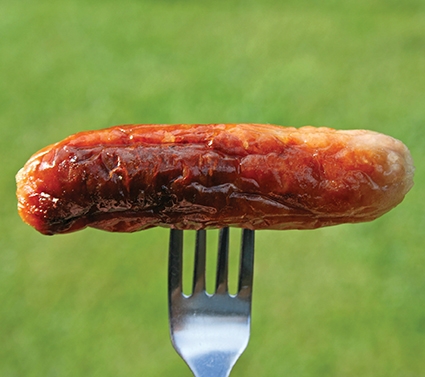50% of Russian Sausages Marked as “Substandard”
Arecent study by Russian quality control body Roskontrol has revealed that numerous sausages sold in stores are substandard.
17 samples were sent to the laboratory, including brands Malakhovsky, VELCOM, Dymov, Cherkizovo, Ostankino, Rublevsky and Klinsky.
“Roskontrol checked the most popular types of sausage products: Moscow, Servelat and Braunschweig sausages,” organization representative Alina Osmak said. “All samples are made in accordance with GOST guidelines, and none of them comply.”
Servelat, under the brands Ostankino and ‘Daily,’ now find themselves on Roskontrol’s blacklist. These are products that the organization does not recommend consumers to buy.
Starch was found in the Ostankino sausage, and in the sausage ‘Daily,’ poultry meat, as well as phosphates.
"Phosphates are used in the meat industry as consistency stabilizers, water retaining agents, and acidity regulators," Roskontrol explained. “Technical regulations allow the use of phosphates in meat products, but total content should not exceed 0.8%.” If it does, the manufacturer must indicate this on the label. Yet, Roskontrol noted, the use of phosphates is not necessary if the product is made in accordance with GOST.
"Phosphates hold water in the body, which has a bad effect on mineral-bone metabolism," explained dietician Elena Tikhomirova. “A person can develop many health problems, for example, diseases of the musculoskeletal system [from excessive phosphate consumption].”
“In three samples (Rublevsky, Ostankino, Cherkizovo), the phosphorus level is higher than the natural level for this type of product. This leads us to assume the phosphates were added as a food additive,” reports Roskontrol.
Sausages under the brands Cherkizovsky and ‘Remit’ were also blasted by Roskontrol following tests, though, the organization noted, they did note improvement in the quality of these sausages compared to past testing.
In the sample of the brand ‘Near Hill,’ experts established clear signs of spoilage and inconsistency with the standards in a number of factors, Roskontrol announced. In the sample of the brand Welkom, wheat fiber was found, though the manufacturer did not indicate its presence on the label.
“Wheat fiber is a wheat bran which absorbs water and increases the mass of the sausage,” Tikhomirova said.
“Sausages under the brands Malakhovsky and Dymov did not meet the standard for the level of moisture content and consistency of minced meat, which contradicts the marking of the sample,” Roskontrol noted.
Sausages from brand Klinsky were the only ones to pass the test with only minor remarks.
According to Roskontrol, more than 50% of sausages tested are on its black list for violations of varying severity.
"The most common problem is the falsification of the content," the organization said. “Meat is replaced with cheaper ingredients of a protein nature (cartilage, skin, poultry meat, collagen and soy protein, etc.).”
Both the cheapest and most expensive sausages can be found on the black list, which once again confirms: it's dangerous to choose only for the cost, as there is not always a relation to quality.
"A huge amount of salt is contained in any sausage products," said Elena Tikhomirova. “The daily dose of salt for an average person is 500 mg, and 100 grams of sausage contains three times that. The consequences are increased pressure, swelling, and potential obesity.”
Roskontrol is a system of independent quality control. The supervisory board of the organization includes representatives of public organizations of consumers, industrial associations of producers and sellers of products.
Dimitri Dolaberidze











